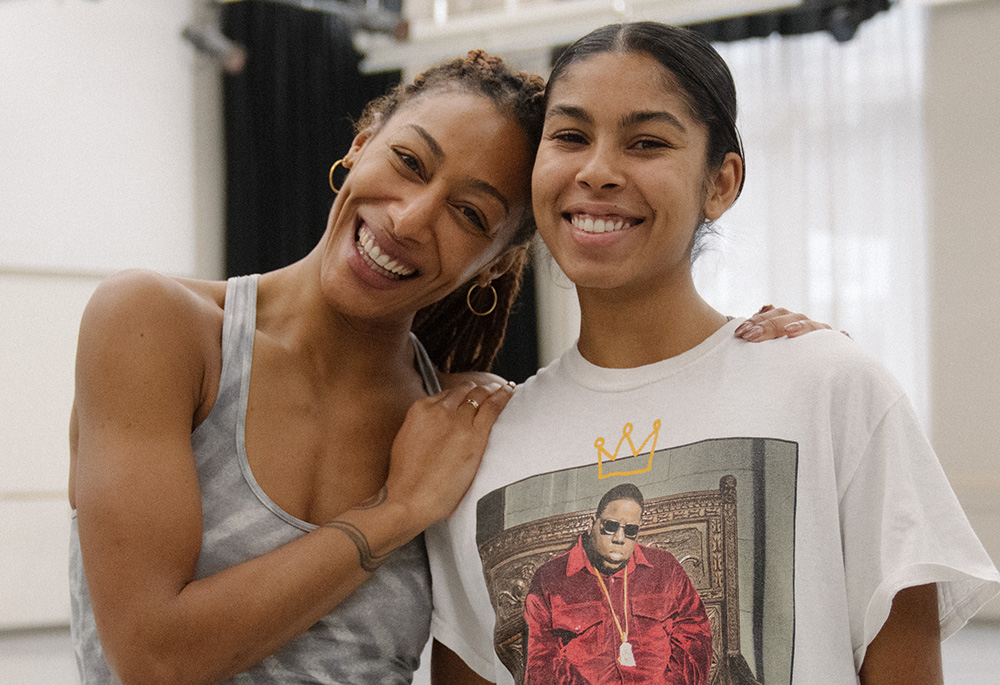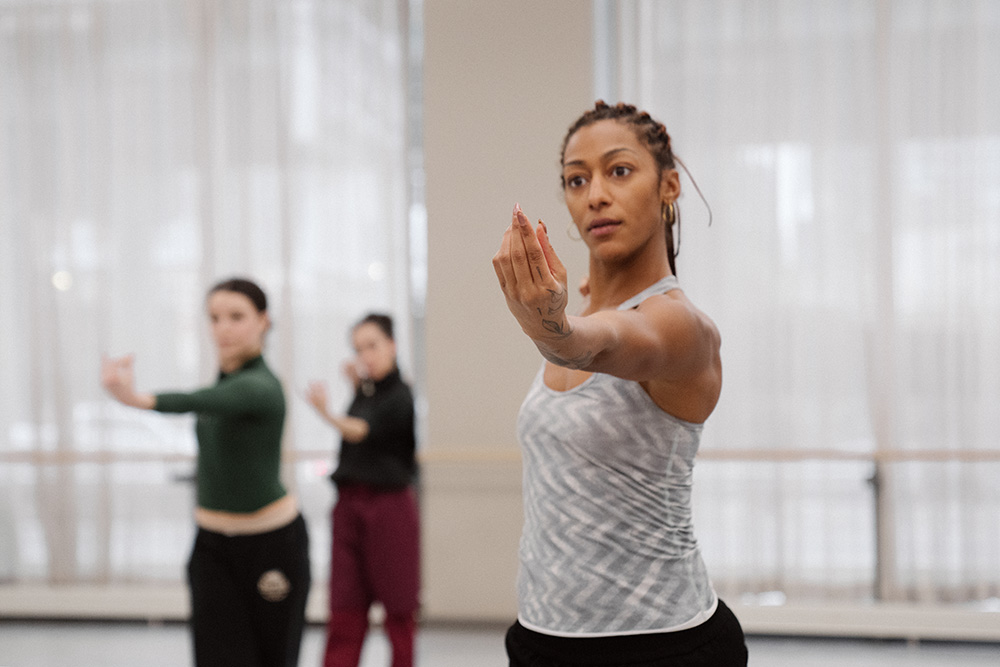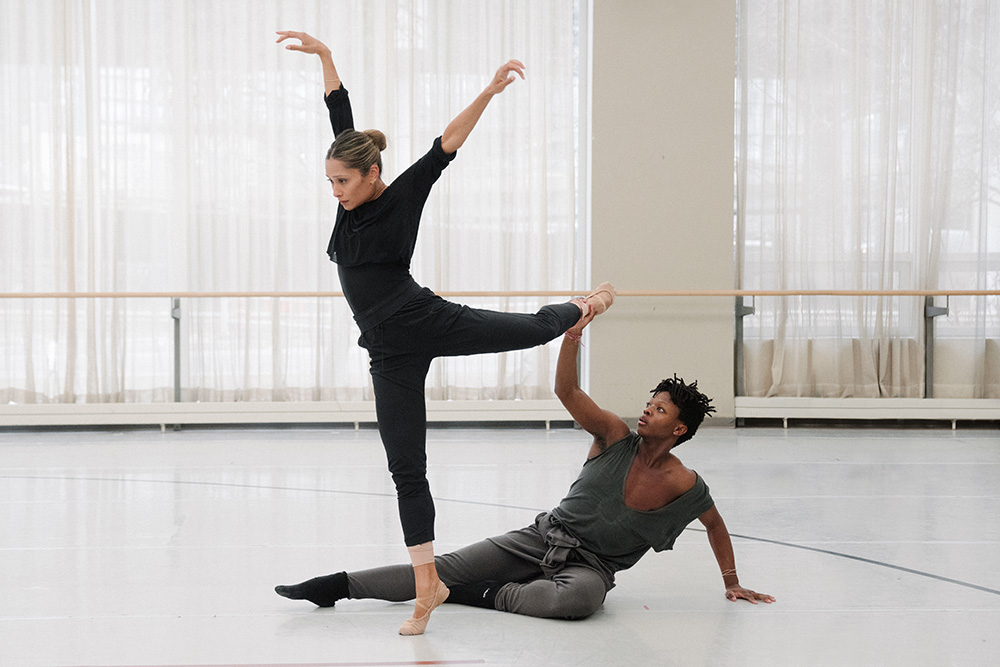Ballet
News+
Existence is the Resistance
Q&A with Choreographer Rena Butler and Corps de Ballet Member Tene Ward
Corps de Ballet member Tene Ward interviewed Choreographer Rena Butler about being a Black dancer and artist today, her most important role models and why being active in the community is important to her. Rena's new ballet, Alleged Dances, makes its world premiere March 3, 2023 at the Four Seasons Centre in Toronto.

Tene: It’s so important for young black dancers to see themselves represented in the art form, as dancers, choreographers, coaches and artistic leaders. Who were some of your role models when you were starting out?
Rena: I loved Grace Jones growing up, how quirky, edgy and worldly she was. A Jamaican-born actress, model, singer and muse for so many designers and artists, she challenged gender norms in the 80s with how bold and androgynous she was. She pushed the bounds of what was expected of women and then to be an African-American woman at that.
I greatly admire Toni Morrison, the essayist, editor, author and famous Black American writer. She was always questioning and pushing back against societal norms. As an African-American activist in the US, she wrote so many insightful think pieces and essays and challenged a lot of publications to publish Black writers.
Black American writer James Baldwin was also influential in my upbringing. Sinking my teeth into his work and watching documentaries and interviews of him had me thinking way more poetically than I should have been at the tender age of 11.
Carrie Mae Weems is also someone I regard highly. A Black American artist, she is famous for her installations, writings and photography. She brought a Black female narrative to the forefront of her work and I feel really visible and seen every time I experienced her work.
And Kyle Abraham, my mentor today. Seeing him build his career and his brand from the ground up was a great experience for me. He’s always remained generous, always finding ways to share, to be open and to just spread a lot of love. He doesn't try to box me in with his mentorship but questions me to help me build my own brand and define myself as an artist.
All of these people were constantly thinking outside of the box and questioning the white mainstream narrative that exists in the US and pushing beyond the trope.

Tene: How have issues of race influenced your voice as a choreographer?
Rena: When I first began choreographing, I felt it was my duty or purpose to make work that spoke of issues of race. Post 2020, post George Floyd, post all the racial issues that find their way into my daily life, I have made it a point to speak about race in my work only when I feel it necessary. I want to be regarded as an artist and not just a Black artist making Black work. Black artists can make work about whatever they want to make work about, whether it is racial trauma, Plato's ideologies of light and shadow and more.
For me, issues of race that I encounter in the world fuel me as a creator to go deeper into my own psyche, exploring everything to do with life, not only race. I try to remain myself and not to code switch in homogenized institutions and spaces. What I'm trying to do as an artist and a creator is to normalize my Blackness in this space. Existence is the resistance and with my art, I'm trying to get at something that's deeper than just identifying who I am as an artist, deeper than identifying I'm Black, I'm female and BIPOC. I am Rena Butler and I have a lot to me, more than just the colour of my skin and the parts that make up my body. I am a thinker, I'm a feeler, I'm an explorer.

Tene: You have been actively involved in your community, supporting black youth in dance. What inspires you to do this work and how does it contribute to positive change, both for Black artists and dance itself?
Rena: Dance has been homogenized, especially in North American and European institutions and companies. Growing up, I only saw myself reflected in companies that focus primarily on and support the African diaspora such as Alvin Ailey or Dance Theatre of Harlem. As much as I love those companies, it never felt quite like me. Growing up, I felt I either had fit into these companies or I'd have nowhere to dance and I wanted to push outside of that box. When you come up with that mentality, your ceiling can only be so high. My push was always for being in spaces that had no ceilings, regardless of my race or gender.
Being heavily involved in my community, especially supporting Black youth and dance, it's important not only to mentor young Black artists to think beyond what's expected of them as artists but to get them to think further and reach beyond places they don't necessarily feel included or invited to. Actively practicing this in my career, I have been a part of companies that were predominantly Black but wanted something else, to shapeshift and to push beyond boundaries. This is so necessary in the dance world in order to include many different people of different races and genders, to diversify, innovate and elevate. When you have a multifaceted institution, it can only grow creatively and artistically because you have many different experiences coming together to collectively and communally build an ambition.
It’s really important for me, other Black artists and for the dance world to open their eyes and ask, how do we move beyond the homogenized narrative that has always been there? How can we innovate? How can we push forward? How can we be inclusive, equitable and expand ourselves as artists?
Alleged Dances is onstage March 3 — 23. Learn more
Lead philanthropic support for Alleged Dances is provided by an Anonymous Donor, with additional support provided by The Producers’ Circle.